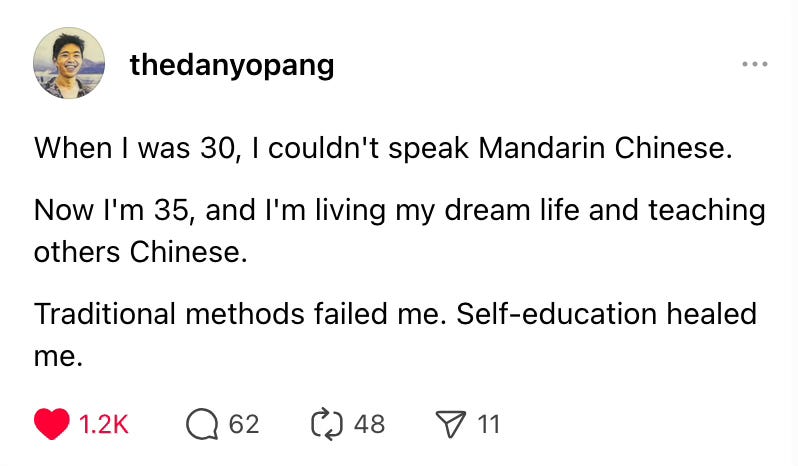Back in 2019, I was working as a doctor in Canada and taking Chinese classes in the evening. My goal was to learn to speak Mandarin so I could travel to Taiwan and order bubble tea. Little did I know I would fail and give up learning many times.
I was full of enthusiasm at the start but also had no idea how to learn effectively. I spent hours memorizing textbook vocabulary, tracing out characters by hand, and studying grammar rules, but my brain felt like a jumbled mess. Nothing was sticking, and I felt overwhelmed and demotivated.
The problem was I was trying to learn Chinese using traditional methods that are boring and ineffective.
This was until I realized there is a better way to learn. A method that is more fun, more personal, takes less time and is more effective.
For context, here is a video of me speaking Mandarin Chinese after almost 6 months of studying using traditional methods:
Not bad but I felt clunky, robotic, and unconfident speaking.
And this is a clip of one of the many Chinese interviews I did after drastically changing my study methods:
Not perfect but I felt much more confident speaking and the words flowed off my tongue naturally without translating in my head.
In this article, I’ll show you how I did that.
I'll reveal the eight most important steps that helped me learn fluent Mandarin and the ones that most learners skip.
But first, we need to understand why traditional methods are hurting your progress.
Traditional methods failed me
Most traditional language-learning methods still rely on outdated, one-size-fits-all approaches designed for a different era.
Take the U.S. education system for example, compulsory schooling started in 1918, not to inspire students or teach practical skills, but to produce disciplined, efficient workers for the Industrial Revolution. The focus was on mass instruction, not real-world learning or motivation.
The result? A system that prioritizes scale over quality, just like the factories it was built to serve.
I experienced this firsthand. After six years of French classes in Canada, I can’t speak a single sentence. And I’m not alone. Many learners share the same frustration.
Traditional education teaches you cold facts and vocabulary when you need stories and connections.
Traditional education is dry and boring when you need fun and compelling.
Traditional education is made for the masses, the “average learner.”
But you are not the average learner. There is no average learner. We all have different learning styles, learn at different paces, and have unique interests.
One learner might learn well visually, while another learns better through audio. One learner might love watching TV shows, while another loves reading books.
One learner might be learning because they want to communicate with their in-laws, while another wants to travel.
Should we expect all of them to learn using the same method and reach the same result?
The new way to learn
The internet has changed how we learn. Anyone who has a connection can access the wealth of resources online. Learning has been democratized.
YouTube has become a marketplace to find your favorite teachers and build the perfect curriculum that fits your learning style and specific goals.
Want to learn Chinese for travel? There’s an online teacher making content about this.
Want to learn Chinese to learn about history and culture? There’s a channel and podcast about that.
Want to learn Chinese to order bubble tea? There’s a video about that.
But while the internet gives us great power, it also demands great responsibility. With unprecedented choice comes unprecedented distractions.
Just like food scientists hacked modern food to make it more processed, salty, and sugary, online content is created with digital salt and sugar to drain your attention and distract your mind.
Be careful with cheap and superficial content—reels and apps teaching you bite-sized content and vocabulary without depth and context.
This is just another form of memorizing vocabulary lists packaged in a cute wrapper to make it look nice. It spikes your dopamine and makes you feel like you’re learning, but at the end of the day, you’ll forget it and will have wasted your time.
So instead here are eight steps to teach yourself Chinese effectively the new way.
1. Get massive input
My Chinese improved the most when I started listening to the language every day, all day, and immersing myself in the language.
And this is backed by science. Stephen Krashen, a renowned linguist, distinguishes between language learning (conscious study of rules) and language acquisition (subconscious absorption through meaningful exposure).
His Input Hypothesis suggests that fluency develops when learners engage with comprehensible input—language that is slightly above their current level but still understandable in context. This mirrors how children learn their first language: through immersion, listening, and gradual internalization rather than explicit grammar lessons.
This is the reason many learners who spend years in a classroom memorizing vocabulary lists struggle to speak naturally and freeze when trying to hold a real conversation. They know the rules but haven’t internalized the feel of the language.
Most learners will get some input while studying, but it’s usually not enough. You need massive input. The goal is to overwhelm your brain with repetition like the jingle you can’t get out of your head. I show you how to easily build a system to do that here.
I remembering the first time hearing the idiom 全力以赴 (meaning "to go all out") on a podcast and after listening to the same episode on repeat, it stuck in my mind effortlessly. Even now, it comes to me automatically when I speak.
But I know what you’re asking: how do you do this if you’re a busy learner?
2. Learning should fit your life
Many learners lose motivation or give up not because they're not smart enough but because they’re trying to jam learning into their already busy lives.
Learning should fit your life, not the other way around.
When learning fits your life, it becomes easy, low-friction, and fun.
How do you do this?
First, you must understand that not all study time is equal.
7 AM me before I scroll social media is worth 100% of my focus, while 11 PM me after a long day of work is worth 5% of my focus.
The value of your time and your ability to focus changes throughout the day. This is different for everyone and their particular schedule. To study effectively you need to understand your energy levels throughout the day.
If learning Chinese is important to you, don’t dump it at the worst time of the day for your focus.
Second, leverage dead time.
Dead time is otherwise wasted time that everyone has throughout the day doing mundane tasks like commuting, walking, doing chores around the house, working out, etc.
These activities are important, and we all have to do them, but our minds are not fully occupied, meaning we can leverage this time to help us learn faster. We can listen to podcasts and play videos in the background and still immerse in the language passively without it taking any extra time out of our schedule at all.
This was how I was able to listen to hours of Chinese content every day while walking and during other dead times without sitting down and studying.
Making this one simple change helped me build massive momentum, and it’s when I saw the biggest improvement in my listening and speaking.
But what should we study?
3. Stop studying beginner material
Learning from beginner material is helpful at first. But the problem is many learners cling to beginner material and never move past it.
Beginner material is like training wheels on your bike. The goal of training wheels is to get you started so you can take them off, not to keep them on forever.
Beginner material is intentionally dumbed-down material so you can understand it. As a result, it’s usually dry and boring. Again, helpful at first, but it holds you back if this is the only thing you’re studying.
The goal of beginner material is to learn the basics as quickly as possible so you can stop using it as quickly as possible (and get to the good stuff).
The good stuff is native content made for native speakers, like podcasts, vlogs, videos, and interviews. This is where you'll learn everyday words, slang, different accents, and the natural flow of the language—things you won’t get from textbooks.
Learning from native material helps you learn authentic Chinese, connect with the culture and make learning fun and motivating.
My Chinese improved significantly when I stopped studying beginner material and moved on to real native material like podcasts, vlogs, YouTube videos, interviews, etc. I show you how to find the best native content to learn Chinese fast in the Copy Paste Speak Course.
The transition won’t be easy, and you won’t understand everything at first, but that’s the point. When you challenge yourself, your brain will be forced to adapt catch up and improve quickly.
But how should we learn from native material?
4. Copy native speakers
Have you ever had a native speaker tell you one thing but do the opposite when they're speaking?
The reason is simple: native Chinese speakers acquired the language as children, not by learning grammar and linguistics at school. So while they may not be able to explain a particular grammar point, they know precisely how to use the language in real life.
My Chinese took a big jump when I stopped listening to what textbooks and even native speakers told me to learn, and I simply observed the real thing: Chinese people speaking and having conversations.
I listened to podcasts, interviews, and vlogs, and I observed the vocabulary they used. I didn’t try to overanalyze it; instead, I simply copied them.
If you copy textbook phrases, you'll speak textbook Chinese.
If you copy native speakers, you'll speak like native speakers.
Say what they say, not what they tell you.
Mimicry is how we all learned our mother tongues, and it's the fastest way to learn as an adult.
If you can observe, you can copy. If you can copy, you can learn.
But what next after listening and copying?
5. Don’t forget to speak
Some language learners think that you should only listen and avoid speaking as a beginner because they say it builds bad habits.
I disagree. Listening is indeed important, but listening alone won’t make you fluent.
Take the classic example of ABCs (American-born Chinese) who grow up hearing the language at home and have good listening comprehension but often struggle to speak because they lack practice speaking and vocabulary.
Listening and speaking are related but different skills and need to be trained differently.
Not to mention there are so many indirect benefits to speaking, I think the pros outweigh the cons:
Helps you connect with other learners and native speakers
Makes learning more fun and interactive
Improves your listening when in conversation
Helps you negotiate meaning add context to learning
Helps you apply & consolidate vocabulary
Helps you practice pronunciation & tones
But for a long time, I avoided speaking because I was scared—scared for many reasons:
Not enough vocabulary...
I should focus only on listening first...
I should perfect my pronunciation before speaking...
Others will judge me...
I'll make a mistake and look silly...
But at the core, I wasn't confident.
I wasn't confident because I wasn't practicing my speaking. And I wasn’t practicing speaking because it was hard, and I didn’t know how to.
Speaking requires you to coordinate many moving pieces: tones, pronunciation, vocabulary use, sentence structure, and more.
But if your goal is to get better at speaking, you need to listen AND speak. Listening is only one half of the puzzle. Speaking helps you apply what you learn when listening. It completes the learning cycle.
To help me do this, every time I listen, I ask myself:
Will I use this soon/asap?
How can I apply this by speaking?
If I can’t answer these questions, it's usually not worth my time. There are too many things to learn, and if I learn everything, I learn nothing. I'll simply forget it, and my time is wasted.
To focus my time, I make sure I am listening and learning vocabulary that I am interested in and want to talk about in the future.
Unfortunately, most learners skip this step because speaking seems too daunting.
But you don’t need to start speaking in a conversation right away. I recommend starting by speaking to yourself and recording yourself to build confidence.
That’s why I created a Speaking Template—the same one I use to build a daily speaking habit which you can download for free.
But to do this consistently you need systems in place.
6. Systems > Goals
Long-term goals are helpful. They give you a vision to look forward to and to direct your learning.
But in the short term, in the day-to-day, big goals are not that helpful. They don’t tell you what you should do today. They can be overwhelming and daunting.
Instead, it's better to build daily systems.
A system is something that you can do every day with the confidence that if you do these things every day, you will improve daily and inch yourself closer to your end goal.
My daily system is simple:
Listen for at least 30 minutes a day passively (I usually do more)
Speak for at least 1 minute a day (I usually do more)
Apply one word I'm learning every day (I usually do more)
You'll notice that I intentionally set the bar low. I make sure that it's easy to get started every day. I lower the friction to start because I know if I get started, it's a lot easier for me to continue.
I know that when I stick to doing these things every day, I make progress, stay motivated, and everything else falls into place. This is why I created the Chinese Speakers Community to help you build the systems that fit your life so you can get fluent without stress.
Creating systems goes hand-in-hand with the next step.
7. Limit studying
It’s easy to fall for the trap of thinking the more you study, the more you learn. This is true theoretically if you're a robot with 100% efficiency. But humans are not robots.
"Work expands so as to fill the time available for its completion." - Parkinson’s Law
This means the more time you give yourself to study, the more time you'll spend procrastinating until the final moments when you need to finish it.
Instead of giving myself lots of time, I limit my study time to learn faster. Sounds counterintuitive, but hear me out.
I cap my active study time at 30 minutes a day—not because I hate learning, but because I love learning and I don't want to burn myself out.
I know that if I set boundaries for my studying, I will come back the next day more refreshed and motivated to learn.
I know that if I give myself 8 hours, it will take me 8 hours, but if I only give myself 30 minutes a day, I am more focused and get more done.
The results surprised me. Despite studying less, I learn more and feel less stressed throughout the day because I'm not worrying about what else I can do.
The final tip might be the most important.
8. Don’t learn in a vacuum
I used to take pride in being a “self-learner” and learning completely by myself. But the problem was I was making a lot of mistakes and learning very slowly.
Self-learning is not about isolating yourself in a room and never talking to anyone.
Self-learning is about self-directed learning, meaning you get to create your favorite learning environment and pick your favorite teachers and learning material.
My listening and speaking skills increased significantly when I started interacting with other people, taking lessons with a teacher, and practicing with language exchanges.
Practicing in real time with native speakers forced me to apply what I had learned in private and put everything together: tones, pronunciation, vocabulary, grammar, etc.
Practicing with other language learners in a safe community helped me get over my nerves about speaking.
The anxiety you feel about your speaking is often about yourself. It comes from a misunderstanding of yourself.
You are not your speaking, pronunciation, or tones. They say nothing about your value or worth as a person. Detach yourself from your speaking and set it free.
Practicing my speaking with others helped me get over my anxiety, figure out my blind spots, and get valuable feedback on how to fix nagging mistakes and improve faster.
This was the missing ingredient that helped me speak fluent Mandarin. That’s why I started the Chinese Speakers Community—to give you all the tools you need to start speaking fluently with a supportive community. I help each learner personally, so I only have time to take on a limited number of learners. You can sign up for the waitlist for the next time we open here.
You can start today
All these steps are simple, but few find them easy. At every step, there is a decision.
What vocabulary should I learn?
What resources should I choose?
How do I keep myself motivated?
How should I practice speaking?
My results aren’t typical because many learners get stuck on these decisions. They don’t realize there’s no “wrong” choice.
Taking action always beats waiting for perfection.
You can start today.
加油,
Danyo
PS When you're ready, here are some ways I can help:
Free Speaking Template: The exact template I used every day to improve my spoken Mandarin without talking to people.
Copy Paste Speak: The 8-step system I used to understand and speak real-life Mandarin like locals in 6 weeks (without drilling hundreds of vocab).
All Trainings: Everything you need to acquire Chinese quickly so you can speak like locals in real-life (not just pass tests).
Chinese Speakers: I’ll help you improve your real-life listening and speaking so you can have Chinese conversations with confidence with one simple exercise a day, 1-on-1 guidance and a supportive community. Apply here.










